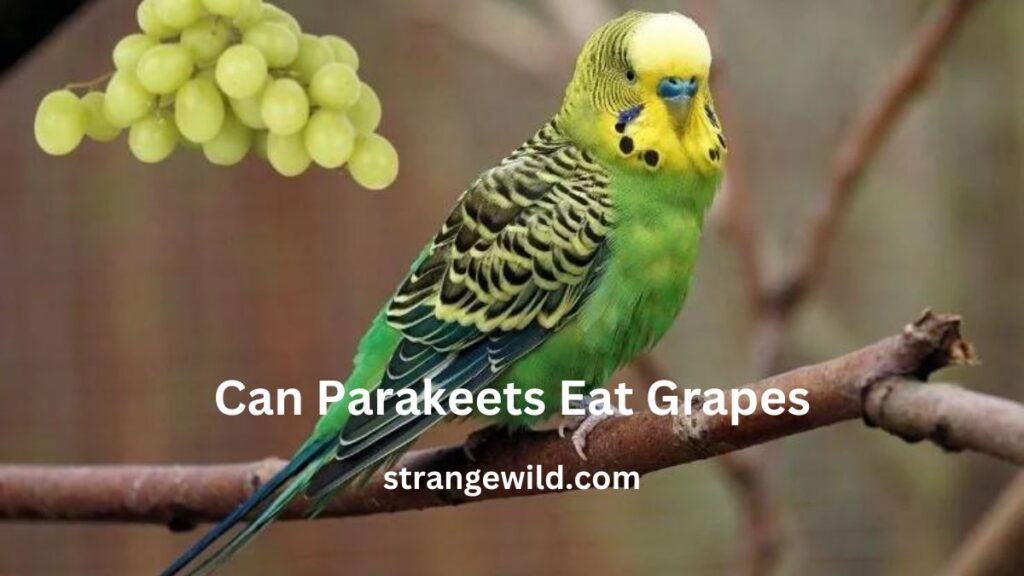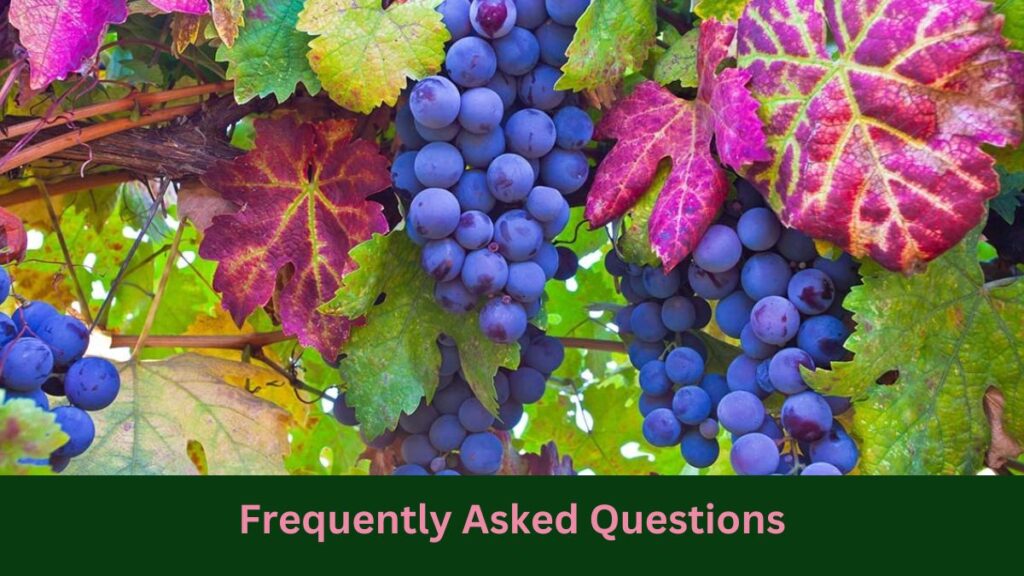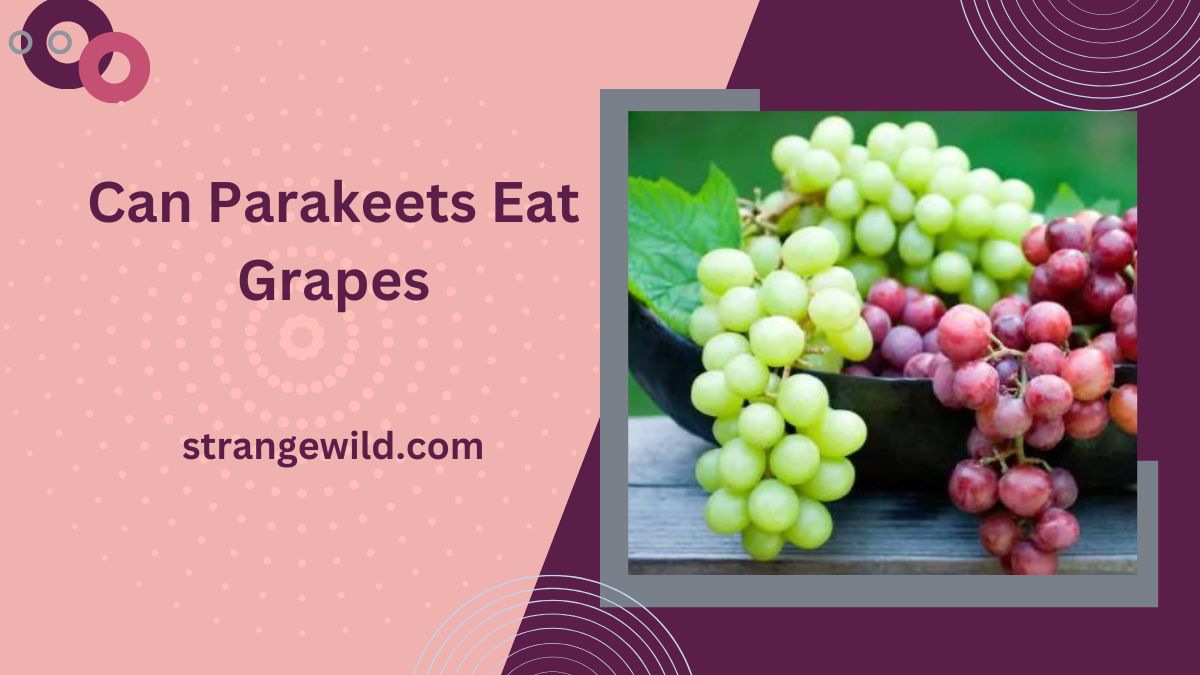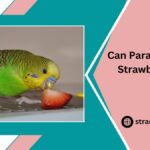Can Parakeets Eat Grapes? Is This Fruit Safe
Can Parakeets Eat Grapes? One of the most fascinating bird species you may own as a pet is the parakeet. Furthermore, they are by far the most often kept pet birds due to their popularity and cost. Budgies are undoubtedly friendly if you own any. However, a common concern among those who adore maintaining budgies is what foods they should eat. Understanding what they can eat and which foods are safe for them might be difficult. Can Parakeets Eat Tomatoes
Do you encounter situations this tricky? Don’t worry; there are various professionals available to assist you, and fortunately, this blog will cover what to feed budgies. Can Parakeets Eat Grapes, in particular? Continue reading to learn more.

Grapes and Parakeets
Let’s start with grapes and budgies. Your feathered buddies hunt for and eat a variety of fruits in the wild. The safety of grapes has raised some questions for certain people. Parakeet Care
First, keep in mind that domesticated and wild parakeets are the same. In other words, if they eat fruits—including grapes—in the wild, they can do the same when domesticated. The next step in addressing our context question is understanding whether or not they ought to consume grapes.
Why would you give them grapes, you might ask? All organisms, including birds, require minerals like manganese, copper, and potassium, which are present in these fruits. Additionally, they are a good source of vitamins A, C, and K, all of which support good health.
Why wouldn’t some bird keepers want to feed grapes to their budgies? Grapes are healthy, but they also contain a lot of fructose, a type of fruit sugar that has been linked to obesity and other issues. This makes them incredibly lovable and sweet to pets, but as we’ll cover below, sugar is one of the things you should try to keep out of your companions’ diets.
Can parakeets eat grapes?
Can you feed parakeets grapes in light of the two diametrically opposed facts listed above? Yes, you can, and doing so is extremely safe. The majority of budgie owners discover that their feathery companions prefer these enjoyable fruits to others, despite the fact that they are in no way harmful. Nevertheless, use them sparingly since overindulging might be dangerous. Instead of consistently giving them, try doing it occasionally. One or two tiny grapes once a week is the maximum amount that some experts advise feeding as a healthful treat.
Why Should Parakeets Eat Grapes?
The majority of you probably already know that pellets and seeds should make up the majority of a parakeet’s diet. Fruits, which have a high fructose content and should only make up roughly 5-10% of their diet, should be given to them as treats along with vegetables.
Now that fruits already occupy a little portion of your feathery pet’s diet, it is crucial to choose the right fruits for them. Because these are intended to be treats, you need to choose a fruit that your parakeets will enjoy as well as one that is healthy. Can grapes meet these requirements? The majority of parakeet owners report that their birds love grapes and frequently overeat them.
Thus, you shouldn’t have any issues with these fruits’ popularity with birds. You can read more about the nutritional value of grapes in the reviews provided below. Look at this:
Resveratrol can be found in grapes
How many of you are familiar with resveratrol? For those who are unaware, it is a plant chemical that is present in a small number of fruits and berries and has potent antioxidant capabilities. Like grapes, blueberries, cranberries, peanuts, and grapes.
The following are some of the health advantages of resveratrol for your parakeets:
- Grapes could shield their arteries from atherosclerosis, resulting in better heart health.
- It enhances your pet’s gene activity in conjunction with vitamin D, which results in a stronger immune system.
- It prevents the body of the parakeet from producing free radicals, defending the cells from oxidative stress.
Your pet’s vision can be improved by grapes
Eating grapes has been demonstrated in numerous studies to raise the protective proteins already present in your retina and decrease the level of inflammatory proteins existing in the retinal structure. Your pets that have feathers share this as well. In other words, feeding your parakeets grapes can provide them with better eyesight for a longer period of time (even when they begin to grow old).
Grapes can help Parakeets maintain a balanced fluid level in their bodies
Numerous studies have demonstrated that grapes have a relatively low salt content and a high potassium content. This is the perfect mixture for your parakeets because it can aid in keeping their electrolyte levels in check and help them get rid of extra water and other pollutants.
Certain cancers can be prevented in pets by eating grapes
Flavonoids, anthocyanins, carotenoids, and stilbenes are just a few of the antioxidants found in grapes that may help lessen the risk of developing some cancers in your pet’s body. Dark-skinned grapes like red and purple grapes contain significantly more of these antioxidants than lighter-skinned grapes.
Your pets’ cardiovascular health can be improved by grapes
In addition to resveratrol, grapes can improve the cardiovascular health of your parakeet in the following other ways:
- Grapes have polyphenols that can raise HDL (High-density lipoprotein) cholesterol levels and reduce inflammation in the body.
- Additionally, grapes contain a lot of potassium. Potassium is in charge of controlling your pet’s blood pressure levels. Which lowers the risk of cardiovascular problems and results in smooth blood flow.
Why Should Parakeets Not Be Overfed Grapes?
We can see that grapes have a lot to offer your feathered pets in terms of health. But most pet owners do the typical error of not limiting how many grapes their animals consume. As we’ve already indicated, they should only consume 5%–10% of their diet as fruit, including grapes. Due to grapes’ high sugar content—which is unhealthy for your parakeets—this is the case. When parakeets eat a lot of sugar, the majority of it is stored in their bodies where it eventually turns into fat.
Your parakeets will eventually get obese due to all the excess fat. One of the most prevalent issues with parakeets is obesity, which may surprise many people. They may become more susceptible to heart disease and other illnesses as a result.
Therefore, moderation is crucial if you want your small birds to enjoy all the health benefits of grapes without experiencing any negative effects. You should give them grapes once or twice a week, in my opinion. Adding variety to their food is another important consideration. You should not simply give them grapes; alternate them occasionally with other foods like apples and bananas.
What else are parakeets supposed to eat?
What other foods can the parakeet eat except grapes? They are a diverse group of wild foragers, therefore variety is essential to a balanced diet. Like other birds, they can survive on a typical diet of seed, but there is no upper limit to that. Although seeds are beneficial, they should only make up a small fraction of the diet due to their high fat content. Both parakeets and people require a varied, well-balanced diet rich in healthy foods to maintain good health and deliver vital vitamins.
The following is a list of the things you should give them:
Fruits
Given that they are a good source of antioxidants, minerals, and vitamins that are good for the skin, these should only make up a modest amount of their diet. There are a number of fruits that parakeets can eat without risk. Oranges, apples, bananas, mangoes, melons, blueberries, strawberries, cherries, blackberries, and apricots are some examples of these. Only raw and fresh foods should be served with each of these. It’s best to only give your budgie a small amount of them.
Be careful not to leave any unfinished fruit in the cage for too long as this can attract insects and sicken your friends. After two hours of feeding, remove them. Pets can also be fed dehydrated fruits like raisins, dry grapes, or mango. Because of the smooth texture, which makes eating dried fruits simpler, and the increased sweetness, they frequently prefer them.
If you have trouble finding fresh fruit on a daily basis, this fruit-based alternative is a great choice. However, the presence of preservatives in dried fruits may harm budgies. To prevent health problems, make sure you only give them small quantities.
Vegetables
Leafy vegetables should be a part of your friend’s diet because they are known to contain a lot of vitamins. Various vegetables include vitamins such as A, B, C, E, and K. The greatest vegetables you can serve are those used in salads, such as lettuce, beets, and cucumber. Additionally ideal are carrots, broccoli, cauliflower, spring greens, cabbage, peas, and green beans. Make sure to boil the beans to prevent poisoning. Only fresh veggies should be given, and they shouldn’t make up more than 20% of the diet or 3/4 cup each day.
Pellets or Seed Mix
Pellets are a perfect food source for budgies and ought to be consumed regularly. They ought to make up about 70% of the diet. They may be unfamiliar to most budgies, but they are nutritious and will support the health of our beloved birds. Be patient and introduce pellets gradually because budgies may have trouble adjusting to new feeding.
Try to gradually increase the number of meals you give them while cutting back on other foods. Due to their fortification with essential vitamins and minerals, most pellets are superior to all other meal options. It’s important to choose the right one for your budgie; stay away from pellets containing artificial preservatives. Give them out sparingly; ideally, one tablespoon per day would do.
Another important ingredient in parakeet meals is seeds. They should not be taken in little doses because they contain a lot of energy. There is an excess of fat and carbohydrates, which could lead to weight gain. Add a small amount of them to the daily pellets to provide nutrition and avoid overfeeding. When choosing a seed mix, be careful to check the mixture’s energy content and freshness. Due to their high-fat content, seeds like flax, sunflower, pumpkin, hemp, and rapeseed should either be used sparingly or avoided.
Legumes and Nuts
Given that parakeets enjoy nuts, including them in their diet is a wonderful treat. Almonds, pecans, walnuts, peanuts, and pistachios are among the nuts that make great additions to the pellets. Even in minute quantities, Brazilian nuts shouldn’t be offered. Make sure to cut these items into bite-sized pieces and remove the shells before distributing them to make swallowing easier. The high protein content of legumes makes them a good choice for budgies. Similar to other people, don’t overfeed them to prevent potential health problems.
Green, yellow, or black-eyed peas, lentils, and beans are the most popular ones. Please refrain from giving your friends any of these raw as it may be hazardous. Mealworms, hard-boiled eggs, and poultry are some additional suitable sources of protein. Cook the birds to perfection before dishing.
Cuttlefish Bones
The finest calcium source for pets is this. Cuttlefish bone is a great substitute for broccoli or food that has been treated with calcium. Get this feed for your bird for strong bones. They aid in bone development and also maintain beaks and claws well-trimmed. Additionally, budgies like to bite on them.
What Foods Are to Be Avoided for parakeets?
It could seem as though parakeets can eat everything. That’s untrue; there are a lot of things you ought to avoid giving children. Don’t be afraid to take action if your buddies start eating them. Even among the aforementioned healthy foods, there are those that should be avoided since they are hazardous.
Among them is: Avocado. Whatever situation you may encounter, avoid this area. It includes persin, a toxic fungicidal toxin that is detrimental to birds. It may result in a heart defect, exhaustion, weakness, and breathing problems.
Salt and sugar
Anything with a lot of sodium or sugar is terrible. Because of this, we never salt carrots or beans before roasting or boiling them. Salt can result in fluid or electrolyte imbalance, which can lead to continuous dehydration and kidney damage, whereas sugar can lead to obesity.
Chocolate: Can Parakeets Eat Grapes
Even in humans, too much chocolate is hazardous. Even small amounts can have an adverse effect on birds, thus they shouldn’t be fed it. This product contains caffeine, which is known to be harmful and can raise heart rates, induce hyperactivity, seizures, and even death.
Tomato: Can Parakeets Eat Grapes
Although you can contribute in little sums, avoiding it altogether is the best option. Tomatine, a toxin found in fruit or vegetables, can cause serious health issues. Why do people eat tomatoes if they’re bad for them? The simple explanation is that we are humans and budgies are birds. In comparison to budgies, we are unaffected by the tomatine concentration.
Garlic and onions
All animals are at risk from the thiosulphate present in these bulb plants. Hemolytic anemia, stomach and intestine inflammations, and gastroenteritis can all be brought on by even a small consumption. All of these ailments can cause a pet’s death.
Apple seeds and fruit pits
Before giving your parakeets some fruits like cherries, plums, peaches, and apricots, you should remove the fruit pits. These components contain cyanide, a toxin that can be incapacitating. Apple seeds are the same way. These fruit components are not even consumed by wild parakeets.
Mushrooms: Can Parakeets Eat Grapes
Can be given to budgies, but some people advise against them. There are some species that should never be fed to budgies. The risk cannot even be lessened by cooking.
Citrus fruit
Citric acid, which is present in limes and lemons, is harmful to budgies. Stomach troubles can result from the acid. Prevention they say is better than a cure.
Practical Advice for Feeding Parakeets
Undoubtedly, you’ve started to realize how difficult it is to care for these birds as pets. Don’t give up if you’re new to birdkeeping. Feeding budgies may be the only significant difficulty you encounter; everything else will go without a hitch. Provide for their stomachs, and they will provide for your social and recreational life.
Try these suggestions for feeding your Parakeets:
- Develop your patience. Give these budgies your tolerance, just as you would while feeding a child. Be patient, especially when introducing new foods. You must work slowly and continuously because they can be finicky and uninterested. Leave the new meal in the cage so they can try it on their own rather than forcing them to eat.
- There should be bite-sized portions of every dish. Giving the bird an entire carrot or mango, for example, would be inappropriate due to its small size and throat. Make the food easy to eat by slicing it up into small pieces to save them the hassle of breaking it down.
- Give them a variety of food. Consider giving them different fruits, vegetables, seeds, and nuts that are suggested from time to time. Find out which foods are each budgie’s favorites and which ones they dislike. Even if they enjoy their meal, it’s important to get them used to eat a variety of foods.
- Mostly, if applicable, give raw, fresh fruits and vegetables. Ones that are dried or boiled might also be offered, particularly for fruits that contain dangerous ingredients. If cooked, let them cool before serving.
Before giving fruits and vegetables to budgies, they should be carefully washed. This helps get rid of any chemicals they might have.
- Take out any food that is left in the cage. If not properly preserved, the majority of meals given while still fresh tend to degrade soon. Bacteria may then find a breeding ground and put your small pet in peril.
- All meals should be served in modest portions, with pellets constituting the majority of what is offered to the budgies. The majority of your treats should be fruits and veggies.
- Keep an eye on your pets’ health. Eliminate some foods from your diet if you are aware that they have an impact. Due to their delicate digestive systems, parakeets are particularly susceptible to harmful ingestible. If you observe odd symptoms that didn’t exist prior to giving them a certain meal, consult your veterinarian.
FAQs on Can Parakeets Eat Grapes

Can Parakeets eat Grapes Skin?
Do you recall earlier when we discussed the advantages of resveratrol for the health of your feathered pets? Let us now inform you that grape skin contains the highest concentration of these antioxidants. Therefore, feeding grape skin to your parakeets is undoubtedly healthful. It is also far too thin to provide them with any difficulties when eating or digesting. There is, however, one thing with which you must exercise caution.
Commercially grown grapes are frequently sprayed with pesticides to deter insects, just like most other fruits and vegetables. Because these pesticides are so dangerous to your pet’s health, pet owners frequently peel the outer skin of grapes as a precaution. However, you don’t have to remove the peel in order to make grapes safe for your birds. Grapes grown organically offer an additional remedy for this issue. The organic grapes are free from any chemicals that could be fatal to parakeets because they are grown in a secure setting.
Can parakeets eat grape seeds without getting sick?
While grapes’ flesh and peel are safe and healthful for your pet birds, there isn’t much scientific evidence on the seeds. This explains why opinions on whether or not parakeets should be given these seeds vary. While some pet owners insist that their parakeets have been eating grapes with seeds without any problems, others think it might be harmful. In any case, it is always better to be safe than sorry when it comes to your pet’s health. I, therefore, advise against giving them grapes with seeds; instead, give them seedless grapes.
Can Parakeets Eat Grapevine Leaves?
In your garden, do you chance to have a grapevine? You’ll be happy to know that these vines have benefits for your avian friends beyond only their fruits. In fact, it wouldn’t be incorrect to suggest that the vines’ leaves are both more palatable and healthier for your pet’s health than the grapes themselves. The fiber-rich, excellent Ca:P ratio of grape leaves makes them a great food for your parakeets. You might give them a few of these leaves each day if you want to.
Can baby parakeets eat grapes?
Yes, young parakeets can eat grapes, but they should only do so occasionally (once a month). The lips of these tiny birds are also far too small to swallow an entire grape. To make them more comfortable, you should chop them into smaller pieces.
Is it okay to give raisins to my parakeet?
Raisins are simply grapes that have been dried; they don’t contain any substances that are specifically dangerous to your feathered creatures. But because raisins are dried out, their sugar level is much more concentrated than that of grapes. This makes it preferable to refrain from giving children raisins.
Is a Parakeet Affected By Grape Seeds?
Grape seeds are not toxic to parakeets. Grapes without seeds can, however, be bought, and this is possibly the safest option as well as one that is simpler for your parakeet’s stomach and general feeding habits.
The conclusion: Can Parakeets Eat Grapes
Concerning what their beloved pet will eat, pet owners have no anxieties. Some of these pets, including some of the budgies, are extremely sensitive and need special care. The talk above was directed at bird owners. Applying the advice in this essay will make it simple for you to feed them. Throughout the week, consistently and routinely offering a variety of dishes is the key. They will remain healthy and eat a balanced diet if they do this. In contrast to common beliefs, it’s important to realize that budgies can consume grapes.





